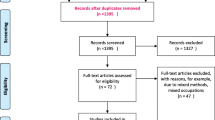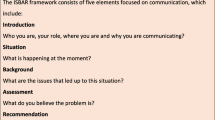Abstract
Several studies have examined how doctors learn in the workplace, but research is needed linking workplace learning with the organisation of doctors’ daily work. This study examined residents’ and consultants’ attitudes and beliefs regarding workplace learning and contextual and organisational factors influencing the organisation and planning of medical specialist training. An explorative case study in three paediatric departments in Denmark including 9 days of field observations and focus group interviews with 9 consultants responsible for medical education and 16 residents. The study aimed to identify factors in work organisation facilitating and hindering residents’ learning. Data were coded through an iterative process guided by thematic analysis. Findings illustrate three main themes: (1) Learning beliefs about patient care and apprenticeship learning as inseparable in medical practice. Beliefs about training and patient care expressed in terms of training versus production caused a potential conflict. (2) Learning context. Continuity over time in tasks and care for patients is important, but continuity is challenged by the organisation of daily work routines. (3) Organisational culture and regulations were found to be encouraging as well inhibiting to a successful organisation of the work in regards to learning. Our findings stress the importance of consultants’ and residents’ beliefs about workplace learning as these agents handle the potential conflict between patient care and training of health professionals. The structuring of daily work tasks is a key factor in workplace learning as is an understanding of underlying relations and organisational culture in the clinical departments.
Similar content being viewed by others
References
Argyris, C. (1995). Action science and organizational learning. Journal of Managerial Psychology, 10(6), 20–26.
Argyris, C., & Schon, D. A. (1974). Theory in practice: Increasing professional effectiveness. San Francisco, CA: Jossey-Bass Inc., Publishers.
Balmer, D., et al. (2007). Learning behind the scenes: Perceptions and observations of role modeling in pediatric residents’ continuity experience. Ambulatory Pediatrics, 7(2), 176–181.
Balmer, D. F., et al. (2008). Understanding paediatric resident-continuity preceptor relationships through the lens of apprenticeship learning. Medical Education, 42(9), 923–929.
Balmer, D. F., et al. (2010). An ethnographic study of attending rounds in general paediatrics: Understanding the ritual. Medical Education, 44(11), 1105–1116.
Bernard, H. R. (2006). Research methods in antropology fourth. Oxford: AltaMira Press.
Billett, S. (2002). Workplace pedagogic practices: Co-participation and learning. British Journal of Educational Studies, 50(4), 37–41.
Billett, S. (2004). Workplace participatory practices: Conceptualising workplaces as learning environments. Journal of Workplace Learning, 16(6), 312–324.
Billett, S. (2006). Constituting the workplace curriculum. Journal of Curriculum Studies, 38(1), 31–48.
Bishop, D. et al. (2006). Learning as work: Teaching and learning processes in contemporary work organisations—Connecting culture and learning in organisations: A review of current themes, Retrieved April 14, 2015 from Cardiff University, Cardiff School of Social Sciences Web site: http://learningaswork.cf.ac.uk/outputs/Connecting_Culture_and_Learning_Final.pdf
Bowen, J. L., & Irby, D. M. (2002). Assessing quality and costs of education in the ambulatory setting: A review of the literature. Academic Medicine, 77(7), 621–680.
Braun, V., & Clarke, V. (2006). Using thematic analysis in psychology. Qualitative Research in Psychology, 3(2), 77–101.
Carr, S. (2003). Education of senior house officers: Current challenges. Postgraduate Medical Journal, 79(937), 622–626.
Cervero, R. M. (2003). Place matters in physician practice and learning. The Journal of Continuing Education in the Health Professions, 23(Suppl 1), S10–S18.
Daugherty, S. R., Baldwin, D. C., & Rowley, B. D. (1998). Learning, satisfaction, and mistreatment during medical internship: A national survey of working conditions. JAMA, The Journal of the American Medical Association, 279(15), 1194–1199.
Eraut, M. (2005). Mapping the problems facing the new surgical curriculum. Bulletin of The Royal College of Surgeons of England, 87(7), 230–235.
Fischer, C., & O’Connor, B. N. (2014). Informal learning in workplaces: Understanding learning culture as a challenge for organizational and individual development. In C. Harteis, A. Rausch, & J. Seifried (Eds.), Discourses on professional learning: On the boundary between learning and working (pp. 11–24). Dordrecht: Springer.
Flyvbjerg, B. (2011). Case study. In N. K. Denzin & Y. S. Lincoln (Eds.), The SAGE handbook of qualitative research (pp. 301–316). Thousand Oaks, CA: SAGE.
Gibson, J. J. (1986). The theory of affordances. In J. J. Gibson (Ed.), The ecological approach to visual perception (pp. 127–143). Hillsdale, NJ: Erlbaum.
Hafferty, F. W. (1998). Beyond curriculum reform: Confronting medicine’s hidden curriculum. Academic Medicine, 73, 403–407.
Haggerty, J. L., et al. (2003). Continuity of care: A multidisciplinary review. British Medical Journal, 327, 1219–1221.
Hirsh, D. A., et al. (2007). “Continuity” as an organizing principle for clinical education reform. The New England Journal of Medicine, 356(8), 858–866.
Hoffman, K. G., & Donaldson, J. F. (2004). Contextual tensions of the clinical environment and their influence on teaching and learning. Medical Education, 38(4), 448–454.
Jarvis-Selinger, S., Pratt, D. D., & Regehr, G. (2012). Competency is not enough: Integrating identity formation into the medical education discourse. Academic Medicine, 87(9), 1185–1190.
Kesselheim, J. C., et al. (2014). Balancing education and service in graduate medical education: Data from pediatric trainees and program directors. Academic Medicine, 89(4), 1–6.
Kuper, A., et al. (2010). Teaching and learning in morbidity and mortality rounds: An ethnographic study. Medical Education, 44(6), 559–569.
Lave, J., & Wenger, E. (1991). Situated learning: Legitimate peripheral participation. Cambridge: Cambridge University Press.
Lieff, S., & Albert, M. (2012). What do we do? Practices and learning strategies of medical education leaders. Medical Teacher, 34(4), 312–319.
Malling, B., Scherpbier, A. J. J. A., & Ringsted, C. (2007). What is the role of the consultant responsible for postgraduate education in the clinical department? Medical Teacher, 29(5), 471–477.
McGlynn, T. J., Wynn, J. B., & Munzenrider, R. F. (1978). Resident education in primary care: How residents learn. Journal of Medical Education, 53(12), 973–981.
Miles, M. B., & Huberman, A. M. (1994). Qualitative data analysis (2nd ed.). Thousand Oaks, CA: SAGE Publications.
Moonesinghe, S. R., et al. (2011). Impact of reduction in working hours for doctors in training on postgraduate medical education and patients’ outcomes: Systematic review. British Medical Journal, 2011(342), d1580. doi:10.1136/bmj.d1580.
Musaeus, P. (2012). Korttidsetnografi - hverken blitzkrig eller eksil [Shortterm Etnography – neither Blitzkrieg nor Exile]. In M. Pedersen, J. Klitmøller, & K. Nielsen (Eds.), Deltager observation: En metode til undersøgelse af psykologiske fænomener (pp. 147–158). København: Hans Reitzels Forlag.
Nothnagle, M., Goldman, R., Quirk, M., & Reis, S. (2010). Promoting self-directed learning skills in residency: A case study in program development. Academic Medicine, 85(12), 1874–1879.
Nothnagle, M., et al. (2011). Struggling to be self-directed: Residents’ paradoxical beliefs about learning. Academic Medicine, 86(12), 1539–1544.
Pimmer, C., Pachler, N., & Genewein, U. (2013). Contextual dynamics in clinical workplaces: Learning from doctor–doctor consultations. Medical Education, 47(5), 463–475.
Reeves, S., et al. (2013). Ethnography in qualitative educational research: AMEE Guide No. 80. Medical Teacher, 35(8), e1365–e1379.
Sargeant, J., et al. (2006). Learning in practice: Experiences and perceptions of high-scoring physicians. Academic Medicine, 81(7), 655–660.
Spradley, J. (2003). Asking descriptive questions. In M. Pogrebin (Ed.), Qualitative approaches to criminal justice: Perspectives from the field (pp. 44–61). Thousand Oaks, CA: SAGE Publications.
Stalmeijer, R. E., Mcnaughton, N., & Van Mook, W. N. K. A. (2014). Using focus groups in medical education research: AMEE Guide No. 91. Medical Teacher, 91, 1–17.
Stok-Koch, L., Bolhuis, S., & Koopmans, R. (2007). Identifying factors that influence workplace learning in postgraduate medical education. Education for Health, 20(1), 1–8.
Temple, J. (2010). Time for training—A review of the impact of the European Working Time Directive on the quality of training, Retrieved April 14, 2015 from NHS, Health Education England Web site: http://hee.nhs.uk/healtheducationengland/files/2012/08/Time-for-training-report.pdf
Teunissen, P., et al. (2007a). How residents learn: Qualitative evidence for the pivotal role of clinical activities. Medical Education, 41, 763–770.
Teunissen, P. W., et al. (2007b). Attending doctors’ perspectives on how residents learn. Medical Education, 41(11), 1050–1058.
Van de Wiel, M. W. J., et al. (2011). Exploring deliberate practice in medicine: How do physicians learn in the workplace? Advances in Health Sciences Education, 16(1), 81–95.
van Loon, K. A., Driessen, E. W., Teunissen, P. W., & Scheele, F. (2014). Experiences with EPAs, potential benefits and pitfalls. Medical Teacher, 36(8), 698–702.
Watling, C., et al. (2012). Learning from clinical work: The roles of learning cues and credibility judgements. Medical Education, 46(2), 192–200.
Wenger, E. (1998). Communities of practice: Learning, meaning and identity. Cambridge: Cambridge University Press.
Acknowledgments
This study is a part of a Ph.D. project funded by Aalborg University Hospital and with additional funds from “Doctor Inger Goldmanns Fund”.
Author information
Authors and Affiliations
Corresponding author
Appendix
Rights and permissions
About this article
Cite this article
Skipper, M., Nøhr, S.B., Jacobsen, T.K. et al. Organisation of workplace learning: a case study of paediatric residents’ and consultants’ beliefs and practices. Adv in Health Sci Educ 21, 677–694 (2016). https://doi.org/10.1007/s10459-015-9661-6
Received:
Accepted:
Published:
Issue Date:
DOI: https://doi.org/10.1007/s10459-015-9661-6




